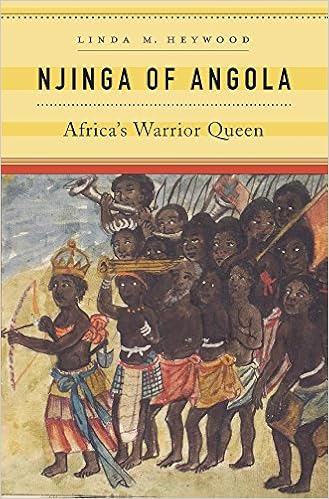Note: I received a copy of Njinga of Angola from the publisher for review consideration. This has not affected the contents of my post.
My brilliant friend Alice told me that this book existed (thanks, Alice!), and I hied me off to the publisher at once to ask for a review copy. I love African history and I love BALLER QUEENS, so you can see that this was a match made in heaven. Njinga was a seventeenth-century queen in what is now northwestern Angola. At a time when European rule was sweeping across Africa, Njinga successfully ruled the kingdoms of Matamba and Ndongo at a time when Portuguese rule was the norm; her political savvy and military success forced the European colonizers to treat with her even as they ran roughshod over numerous other sovereign nations in Africa. Njinga was also a slave trafficker (slave export was one way that she preserved her economic power) and practitioner of human sacrifice.

Njinga of Angola is the first ever (I know!) English-language biography of this queen. Linda Heywood has done a tremendous amount of archival research to track down Njinga’s story. The sister of Ngola a Hari, a king who was very medium at getting what he wanted from the Portuguese, Njinga did not begin her political career until she was thirty-five years old. She was deputized by her brother (who had previously killed her infant son and sterilized her and her sisters to prevent them from becoming a threat to his rule) to negotiate with the Portuguese on his behalf.

After this mission, she gained sufficient popularity and power to feel comfortable murdering her jerk brother and taking over his throne. Then she married the Imbangala gentleman who had custody of her brother’s little son. At the wedding, she killed the kid and threw him in the river.
This story brings up (for me) one of the problems with Njinga’s story: Like a lot of African history, we’re depending heavily on European records to know what’s going on. Later on in life, Njinga was a prolific letter-writer, corresponding with major European religious and political figures in an effort to achieve her diplomatic goals. But even then, historians have very little access to her innermost thoughts, depending instead on the image of herself she was presenting to powerful Europeans as a powerful African. So we are able to know about her only what European writers saw, or what she chose to present to European priests, kings, and governors. Anything they didn’t see, we can’t know. It makes for a slightly bloodless story, as the reader is necessarily at one or two removes from Njinga’s true motives and feelings.
With that being said, though, Heywood makes it clear how savvy Njinga became to what the Europeans expected and wanted from her, and what she could expect and request from them. Recognizing that the Europeans were using the pretext of moral virtue to steal land, and aware that her own military successes gave her a degree of bargaining power, she used the idea of cannibal savages as a tool to defend her own moral virtue and claim to the land: Whereas these groups of Africans are bad and wicked, with barbaric customs and irredeemable morals, my group of Africans is righteous and Christian.
The most tragic thing in this book (to me, a sisters-having person) is that Njinga’s two sisters were taken captive by the Portuguese, and they were spies for her. I was very struck by how brave they were and what impressive assets to Njinga as a ruler — one sister spied for her for years until she was caught and executed. The other converted (allegedly) to Christianity under Portuguese rule, and her (apparent) piety was a crucial bargaining chip when Njinga was requesting protection as a fellow Christian. Negotiations over the second sister’s release went on for years, and by the time the women were reunited, the sister — now called by her Christian name of Barbara, formerly known as Kambu — had been a prisoner of the Portuguese for over a decade.
Njinga threw herself on the ground in front of Barbara, rubbing herself in the soil as was customary when a person received a favor or when dependents paid homage to masters or superiors. Given permission to approach Barbara, Njinga kissed her sister’s hand and knelt once more, letting her face drop to the ground once again. After this ceremonial greeting, the two sisters embraced and for a long time held on to each other tenderly, not speaking a word, but kissing each other repeatedly.

Next I would like to read an article / series of articles / whole damn book about contesting memories of Njinga. Wouldn’t that be interesting? Contemporary Portuguese accounts often lean heavily on Njinga’s conversion to Christianity and how sincere it may have been, or on the notion that she was a cannibal savage who sacrificed humans in barbarian rituals (this carrying of course a very, very different moral valence than the actions of Portuguese slave traders in the same historical period). In post-independence Angola, Njinga has been revered as a symbol of resistance to colonizing powers.
Njinga of Angola is a tremendous feat of research and storytelling, a vital piece of the massively complex story of African resistance and diplomacy in the face of European colonialism. Much recommended.